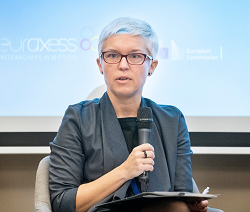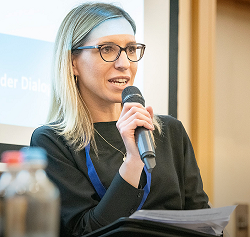
During the first day of EURAXESS BHO meeting, which took place in Brussels on 22 of October 2019, EURAXESS Stakeholder Dialogue – Brain Circulation in Europe event was held. The event, in which representatives from 42 European countries participated intending to analyze the current state of “brain circulation” in Europe, exchange ideas and best practice on researcher mobility topics, as well as explore transnational synergies and collaborations that can further remove the barriers of mobility, was organized by European Commission. This event also set the grounds for the policy agenda of Pillar IV of Horizon Europe - Strengthening the European Research Area (ERA).

In the opening session, Mr. Kurt Vandenberghe, Acting Director of the European Commission's Directorate-General for Research and Innovation gave an overview of the topic of "brain circulation”. Ms. Ivana Pavlaković, Head of Sector for Scientific System and Technological Development at the Ministry of Science and Education of the Republic of Croatia held a speech on "brain circulation" as one of the priority topics in the context of the forthcoming Croatian Presidency of the Council of the European Union in the first half of 2020.

Ms. Ana Ključarić, Head of the Department for Mobility of Researchers at the Agency for Mobility and EU Programmes participated in the panel discussion The network of collaborative networks. The Department's work was presented as an example of the good practice of collaboration of EURAXESS network with the network of Horizon 2020 national contact points. The benefits of such collaborations are multiple, as researchers receive administrative and legal support regarding mobility and career development, as well as information on employment and funding opportunities in one place.
In various panel discussions in this event, on more occasions, it was emphasized the impact of two key European Union policy documents on enhancing the careers of researchers: European Charter for Researchers and a Code of Conduct for the Recruitment of Researchers, both adopted by a European Commission in 2005. Based on these documents the working conditions for researchers in the European science institutions was improved. It was also emphasized that their full implementation into national systems of science and higher education is a long-term process necessary to improve the conditions for international, intersectoral and interdisciplinary mobility of researchers, and thus "brain circulation". The Agency for Mobility EU Programmes contributes to these processes by promoting the principles of the Charter and the Code and supporting scientific institutions in the Republic of Croatia in the implementation of these principles to develop the Human Resources Strategy for Researchers (HRS4R) and to receive HR Excellence in Research logo and thus became more attractive to foreign researchers.
